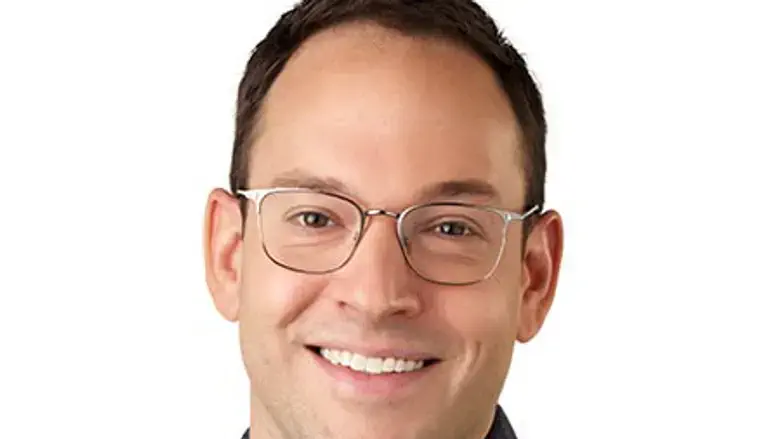
The Sonneborn Foundation
On July 1, 1945, David Ben Gurion held a meeting on what he would later consider one of the three most important days of his life. The most important was his immigration to Palestine on September 7, 1906. The second was the establishment of the State of Israel on May 14, 1948. But the third was this meeting.
In the months immediately following the end of WW2, Ben Gurion’s mind turned to the day after the British Mandate. The war was over, the British won, but they were still in Palestine. But not likely for much longer. He wanted to declare a Jewish State as soon as possible, but, being a pragmatist, he needed to ensure the yishuv was ready for the day after. He knew, deep down, that as soon as they flipped the switched and declared a state, the Arab states would attack en masse.
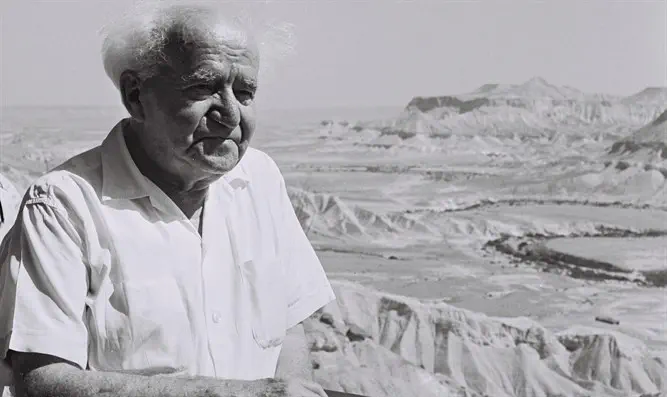
After the war, Ben Gurion visited America. There, he met with, among others, Henry Montor, the future chairman of the United Jewish Appeal (UJA). Ben Gurion told Montor about the need to procure arms to be prepared for the inevitable war. Montor gave him a list of 17 wealthy American Jews, who were prepared to help.
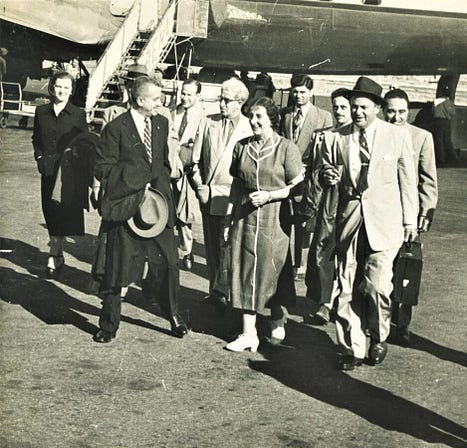
Henry Montor (left, holding hat), talking to Golda Meir in 1954
Ben Gurion called each of the names on the list, and invited them to a meeting in the New York home of the wealthy oil executive Rudolf Sonneborn, to be held Sunday July 1, 1945.
Held on a sweltering summer day, Ben Gurion, sweating through his white shirt, spent the entire day talking to these wealthy Americans about his Zionist perspective. He told them a war would need to be fought once a state was declared, and that the Jews would need to fight for their existence. As the American government was beginning to sell military surplus equipment (now that WW2 had ended), he asked these friends of Israel to set up a special fund to procure weapons. Dazzled by his passion, the donors agreed. The money flowed.
The special fund was given a codename: The Sonneborn Foundation. The donations flowed in, military machinery was purchased, and equipment was shipped to Palestine. It became the foundation of Israel Military Industries. The three years they spent obtaining weapons were vital for Israel to win the War of Independence. Years later, Ben Gurion wrote to Sonneborn: “I will never forget - I think that our people will never forget - that meeting in your home on 1.7.1945 which enabled us to create our military industry.”
This group of 17 donors, at least in Ben Gurion’s perspective, helped Israel win its first - and most important - war.
UJA Campaign Launch
I was reminded of this episode while attending the UJA Campaign Launch last night (Sept 11) at Meridian Hall in Downtown Toronto. Along with around 2,500 others, we carried the legacy of the Sonneborn Foundation forward. Together, donors, volunteers, staff, lay leaders, old, young, and people who just wanted to see Bari Weiss and Rabbi Wolpe speak, took part in ensuring that our community’s connection with Israel is secure.
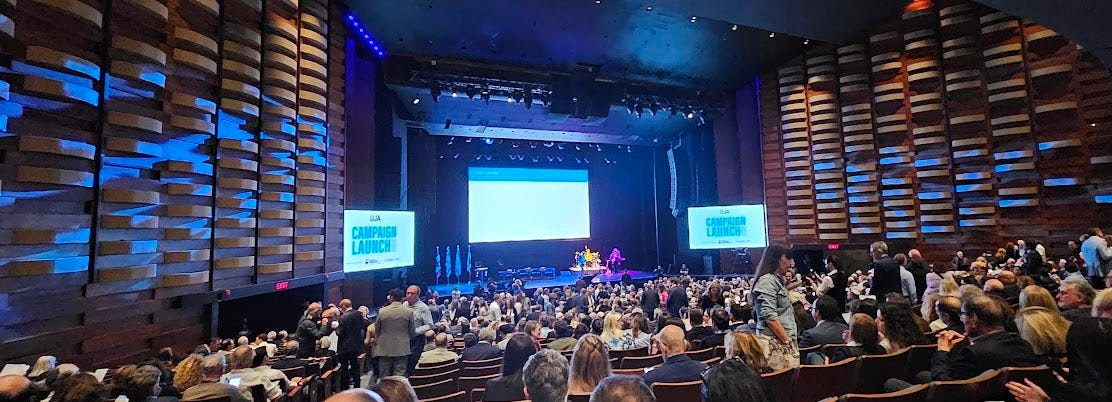
Photo by Adam Hummel
Over the years, I’ve been to many of these events. We are often there to see the headline act, and (apologies to my friends who work at Federation) we usually tolerate the speeches from the chairs-of-this and the campaign-leaders-of-that, waiting for the main event.
But, last night was different. After an exhaustingly emotional year, we could have been excused for being jaded by the speeches, and just wanting to get into the meat of the evening. But, I found myself totally moved by the intimacy of the moment. The speeches spoke to our immense impact as a North American community, the videos highlighted the situation in Israel over the last year and our community’s ability to make some sort of difference there. In a year when it has been frustrating at times to be a Canadian Jew, this event showed me why our community is, frankly, amazing.
I spent more time than I expected wiping tears from my eyes. Joyful tears when I heard how much money had been raised through UJA’s emergency campaign, and how much had already been raised for this year’s campaign ($30 million).
I was moved to tears watching a video about Rami Davidian, a 58 year old farmer from Moshav Patish, near Gaza, who saved 750 people on October 7. I wept more tears watching a video of Avihai Brodutch speak about how his wife Hagar, and three children, Ofri, Yuval, and Oriya, had been kidnapped by Hamas, to be returned to him, alive, two months later. They had spent time in Toronto this summer, visiting family, who were in the crowd. My heart broke when the names of those still held in Gaza made their way across the projector screen, and the number “1”, his age, showed up next to the name of the youngest hostage, Kfir Bibas.
Haas, Weiss, Wolpe
In the second half of the evening, we heard from a panel made up of the actress Shira Haas, the indomitable Bari Weiss, and Rabbi David Wolpe. Already touched by UJA’s presentation, it was now time to be inspired. My friend Steve McDonald knocked his moderator job out of the park.
The speakers set the tone of their discussion by reminded us that in these trying times, adversity is often nothing more than a call to action. When we get knocked down, it is time to get back up, but stronger.
Rabbi Wolpe, with his charm and wit, told us that we as Jews need to do better finding allies. “We are often better at identifying our enemies than embracing our friends,” he said. But it takes courage to stand up, and lead, especially when we think that people don’t want to hear from us. And no one knows this better than Rabbi Wolpe, who had the misfortune of spending the last year as a visiting scholar at Harvard, seeing what this Ivy League bastion allowed to fester in its hallways.
We are not just here to fight antisemitism. We are here to be Jews.
To that, Bari Weiss told us that, “sometimes, we need to rip out from our arms the heroine needle that is the status and prestige we often crave, in a world that is lucky to have us.” By this, she meant that though we as Jews often aspire to the greatness that may come with ivory towers, at the end of the day, we should not diminish our knowledge of our own greatness - the world is, indeed, lucky to have us. It’s too bad they just don’t realize it yet.
Weiss also noted that when she was recently in Israel, reporting on the war, she felt envious, in a way, about the Israeli way of life, a life seemingly full of intention, and purpose. She said that she often thinks about the lives of Israelis, and wonders what capacity we in the Diaspora have to rise to opportunities of greatness. That we need to keep reminding ourselves that we are not just here to fight antisemitism, but rather, that we are here to be Jews. Period.
Finally, the speakers talked about what gives them hope. Haas said that it was the crowd before her, here in the Diaspora, that gives her hope and strength. Weiss noted that what gives her hope is looking backwards, and remembering that though we may feel caged in at times as Jews, that we still should feel privileged for being Jews today, in 2024, in a country that protects its Jews, where police protect our schools, and where there are rules and laws on which we can rely.
Rabbi Wolpe repeated the sentiment about looking backward, and realizing our place in the world today. He shared that he had imagined a conversation with his great-great-great grandfather. He said to his ancestor, “It’s too bad, we’re having a tough time with the antisemitism at Harvard.” Flabbergasted, his ancestor blurts out, “There are Jews at Harvard?!?” The Rabbi continued, “Ya, but there’s a lot of hatred against Israel.” Again, his ancestor shouted, “There’s an Israel?!?” Perspective and hindsight are sometimes all we need.
Privilege
And it’s this point, about privilege, about realizing our place in history, and about having the courage to stand up and do the right thing, that stayed with me as I left the theatre yesterday evening and was handed my bag of complimentary bagels.
I have always been motivated by the idea that, “if you have the ability to take action, you have the responsibility to take action.” What the event last night did was demonstrate that we as Jews today absolutely have the ability to take action. Sure, we are both wealthy and generous, and can wield influence when we need to, but the most important thing that we can do is take care of each other.
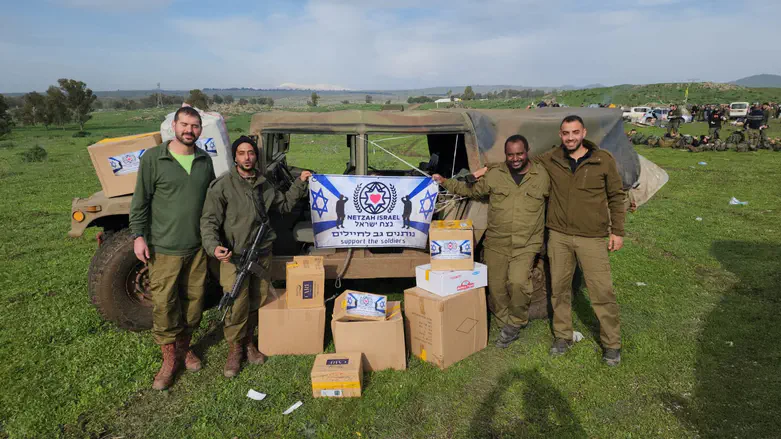
In the last 11 months, we have thrived in taking care of each other. Whether it was wiping away each other’s tears upon learning tragic news, or sending equipment and funds to Israel to help displaced people, or donating to our social services right here in Toronto, we have always excelled at caring for each other.
Last night reminded me that we have the ability to do so much. Now that we know we can, we ought to realize that we must. Kol Yisrael arevim zeh l’zeh - all of Israel are responsible for each other.
Though tragedy may have prompted this surge, tragedy cannot define our future. That future can be shaped both by those 17 who show up to a sweaty New York apartment, or those 2,500 who attend a campaign launch in a theatre. Together, we say:
We are Jewish.
We aren’t going anywhere.
Am Yisrael Chai.